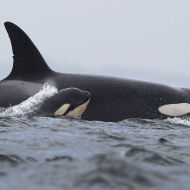
Study could help solve ‘evolutionary puzzle’ of menopause
A new study from the University of York has found that post-menopausal killer whale grandmothers have the largest beneficial impact on their grand-calves’ chances of survival.
The research team was made up of groups from the Universities of York and Exeter, the Centre for Whale Research and Fisheries and Oceans Canada – analysing 36 years of data on two populations of resident killer whales.
Researchers suggested that because grandmothers who can no longer reproduce have no calves of their own, they therefore have more free time and resources to focus on other offspring. This is supported by the fact that the impact on calves that lost a post-menopausal grandmother was greater in years when food resources were scarce.
Previous studies have revealed that, when foraging in salmon grounds, post-reproductive female killer whales fill an important leadership role for the group as they are the most knowledgeable. The authors of the study theorise that these benefits to the group could help to explain why the menopause has only evolved in some species of whales and humans.
Dr Dan Franks from the University of York’s department of biology said: “The study suggests that breeding grandmothers are not able to provide the same level of support as grandmothers who no longer breed. This means that the evolution of menopause has increased a grandmother’s capacity to help her grand-offspring.”
Lead author of the study Dr Stuart Nattrass, from the University of York added: “The findings help to explain factors that are driving the whales’ survival and reproductive success, which is essential information given that the Southern Resident killer whales - one of the whale populations under study - is listed as endangered and at risk of extinction.”



 The RCVS has announced a new version of its 1CPD mobile app, with enhanced features for veterinary surgeons and veterinary nurses to record their continuing professional development.
The RCVS has announced a new version of its 1CPD mobile app, with enhanced features for veterinary surgeons and veterinary nurses to record their continuing professional development.